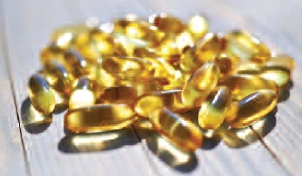Globally, the omega-3s market is big bucks. The Global Organization for EPA and DHA Omega-3s (GOED) recently estimated that revenue in 2013 from omega-3s was $1.79 billion worldwide and volume was 88,074 metric tons (1).
While worldwide sales were up 11% from the previous year, the same cannot be said for what’s been going on here at home in the mainstream channel. U.S. sales of omega-3s have fallen significantly, but why? And importantly, how can retailers help ensure customers come back to this vital segment of the supplements category?
Stagnant Sales
GOED estimates that 2013 sales of omega-3s fell to what they were in 2011, and the downturn has continued in 2014, with each month down 10–12% compared with the same time last year (see Chart 1). Wael Massrieh, Ph.D., vice president of scientific affairs at Neptune Technologies & Bioressources, Inc., Laval, QC, Canada, says the monthly drops add up to about $100 million per year and approximately 12 million lost consumers.
Negative press. There is so much to consider about which product areas are feeling the blow and why. One reason for buyer hesitation with regard to omega-3s may be the media (1). According to GOED research, about 80% of U.S. shoppers were exposed to negative press on omega-3s by major media outlets in the third quarter of 2013. Meanwhile, exposure to positive stories took a nosedive (1). One of the most notorious was the study published in the Journal of the National Cancer Institute suggesting that omega-3s increase prostate cancer risk (2).
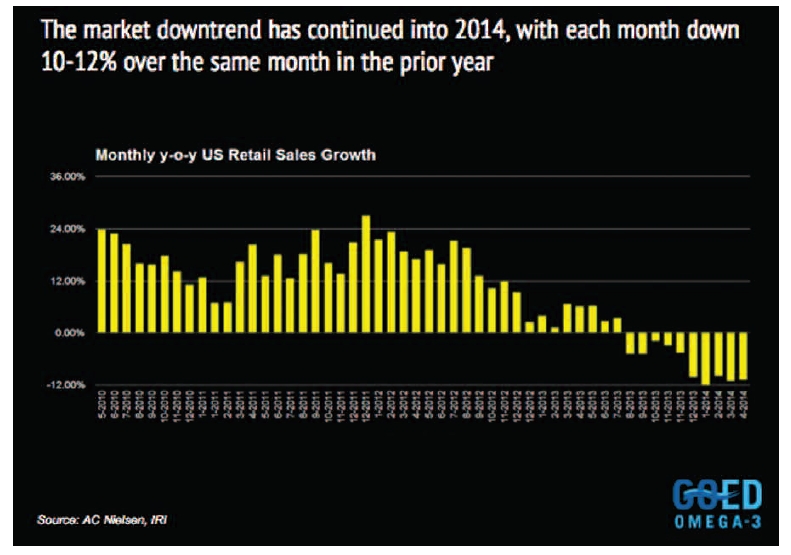
Many shoppers got a negative impression of fish oil thanks to the study, even though its methodology had many holes. “In reading the details of that study, it is evident that the authors make claims intending to sensationalize negative findings, which don’t actually hold water,” says Massrieh. “Plasma phospholipid fatty acids as measured in this study are not a good index of long term intake and are influenced dramatically by a single meal, or even timing of a fish oil dose.’’
Neil E. Levin, CCN, DANLA, nutrition education manager at NOW Foods, Bloomingdale, IL, also highlights some problems with the study: “The negative report on fish oil and prostate cancer was rightly criticized for utilizing low ‘high’ doses, ignoring reports of good prostate health in countries consuming large amounts of fish and/or fish oil, and utilizing food intake questionnaires that are both notoriously inaccurate and also rely on inaccurate and imprecise USDA food tables for analysis of EPA-DHA levels that vary considerably by fish and by where and how they are raised.”
Tips for launching a counterattack. What can a retailer do to ensure continued sales of marine oils when negative news is circulating?
Robin Koon, executive vice-president of Best Formulations, says that stores can help bring negative studies into perspective for shoppers. Tell customers that one study doesn’t make or break a category. “[It] should not and cannot negate the value of thousands of positive ones. Educating consumers on this issue/topic is probably the best things retailers can do,” says Koon.
Specifically, Steve Holtby, president and CEO 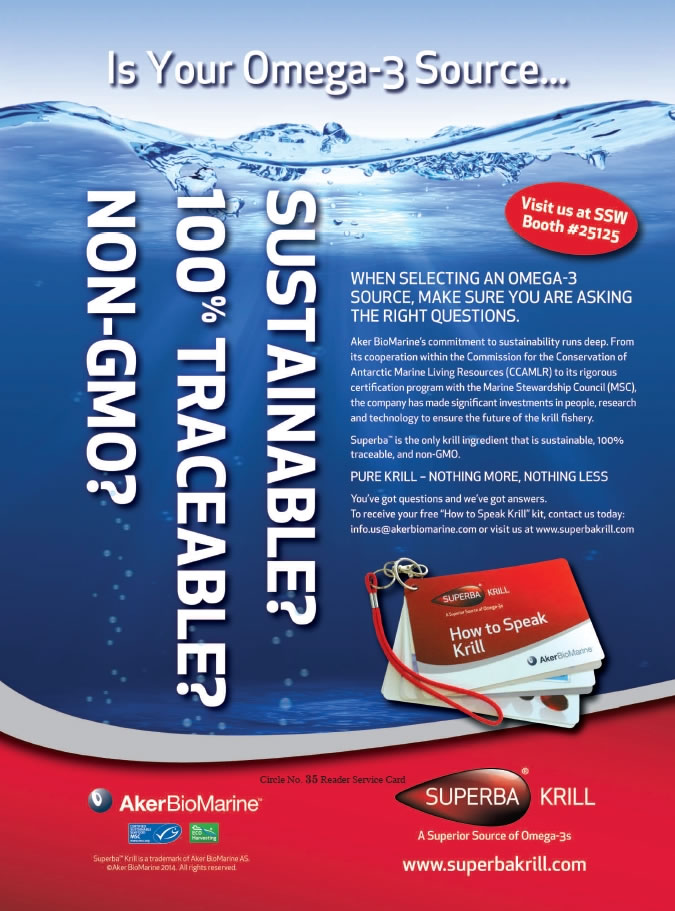 of Soft Gel Technologies, Inc., Los Angeles, CA, says that fish oil has a long history of safe use and clinical support. “There is plenty of information out, and retailers can suggest that the consumer be of a skeptical mindset, and do their own research before coming to the same conclusion,” he states.
of Soft Gel Technologies, Inc., Los Angeles, CA, says that fish oil has a long history of safe use and clinical support. “There is plenty of information out, and retailers can suggest that the consumer be of a skeptical mindset, and do their own research before coming to the same conclusion,” he states.
Dallas Clouatre, Ph.D., consultant for R&D, Jarrow Formulas, Inc., Los Angeles, CA, says retailers can help customers find trustworthy news sources when they want to dig deeper into a nutrition topic. But, be careful not to make any health claims. “By recommending news sources for general edification in the area of nutrition rather than specific articles touting particular products, retailers avoid possible charges of ‘extended label claim’ being leveled,” he states.
Effectively getting the word out to shoppers about all this is also about speed and technique. Try social media, says Trisha Sugarek MacDonald, B.S., M.S., director of research and development and national educator at Bluebonnet Nutrition Corporation’ Sugar Land, TX. She suggests retailers check out rebuttals from large brands and then produce their own recaps. One could even send such rebuttals to local media outlets.
“This recap can be posted with a link to the rebuttals from larger companies so that consumers can vet through expert opinions of the research on their own. This will provide consumers with the knowledge that not all studies are created equally, and that sometimes only correlations are gathered—not causations,” she explains. Just because two factors may be correlated, it doesn’t automatically mean that one causes the other. “That is the problem with cohort analyses. They only show associations. In order to test for causation, you need gold-standard testing—randomized clinically controlled trials that test cause and effect mechanisms,” says Sugarek MacDonald.
Another point to stress to consumers, in addition to the health benefits of EPA and DHA from fish oil found in studies, is that most Americans need supplementation. About 90% of the U.S. population is deficient in omega-3, says Tone Larsen, product development manager at Nordic Naturals, Watsonville, CA.
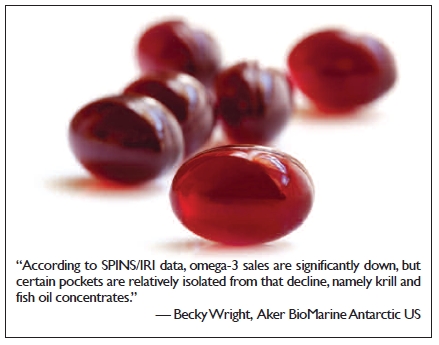 According to Michael T. Murray, N.D., director of product science and innovation for Natural Factors, Monroe, WA, EPA and DHA levels may be especially low in vegans and vegetarians that don’t eat fish. In a recent four-month study (3), researchers found “roughly two out of three vegans having levels below 4% and one out of three even lower at less than 3%. These results clearly show that a substantial number of vegan subjects have low omega-3 status,” he states. In the study, those given an algae-derived EPA/DHA experienced a bump in their omega-3 index from 3.1% to 4.8%.
According to Michael T. Murray, N.D., director of product science and innovation for Natural Factors, Monroe, WA, EPA and DHA levels may be especially low in vegans and vegetarians that don’t eat fish. In a recent four-month study (3), researchers found “roughly two out of three vegans having levels below 4% and one out of three even lower at less than 3%. These results clearly show that a substantial number of vegan subjects have low omega-3 status,” he states. In the study, those given an algae-derived EPA/DHA experienced a bump in their omega-3 index from 3.1% to 4.8%.
One resource that retailers can tap for educational backup, suggests Andreas Koch, marketing director for Barlean’s, Ferndale, WA, are industry trade associations, which might be able to provide easy-to-understand one-pagers that staff can use to answer shoppers’ questions.
Levin names several, noting, “The Natural Products Association, the Council for Responsible Nutrition and the American Herbal Products Association have all issued rebuttals to various negative reports. GOED and other specialized organizations also have provided science-based opposition to negative studies and media coverage. The Alliance for Natural Health-USA and Your Voice for Health are consumer-based advocacy organizations that also provide rebuttals to attacks on natural products, as well as being involved in other advocacy issues.”
While you’re using these groups as resources, 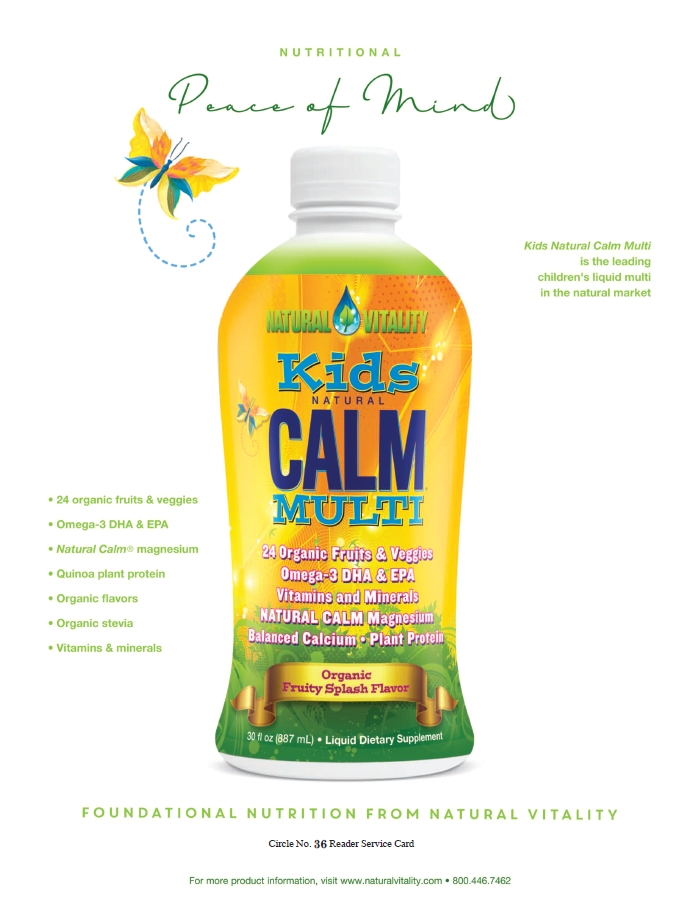 be sure to support them financially. Says Kenn Israel, vice president of marketing for Robinson Pharma Inc., San Juan Capistrano, CA, “We as an industry need to be unified and use our dollars together to do the work that none of us as individuals would take on.” This includes market studies about how supplements can reduce healthcare spending, clinical research, rebutting negative media reports and promoting relevant public health policies.
be sure to support them financially. Says Kenn Israel, vice president of marketing for Robinson Pharma Inc., San Juan Capistrano, CA, “We as an industry need to be unified and use our dollars together to do the work that none of us as individuals would take on.” This includes market studies about how supplements can reduce healthcare spending, clinical research, rebutting negative media reports and promoting relevant public health policies.
In the end, knowing about the benefits of marine oils inside and out is key to ensuring shoppers stick with the category, even if the media circus is in town. States Becky Wright, marketing director at Aker BioMarine Antarctic US, with global headquarters in Oslo, Norway, “It is [the retailer’s] job to be as educated as possible when it comes to the different forms of omega-3s. So, for example, if a customer has a concern about fish oil, retailers need to know what else they can offer them to meet their needs, whether it be other marine omega-3s like krill or algae.”
Adds Dan Murray, vice president of business development of Xsto Solutions, LLC, Morristown, NJ, “The peaks and valleys of consumer demand can be smoothed with a stronger knowledge base, but that’s a long-term project.”
Implications for natural retailers. While some shoppers have shied away from fish oil because of the negative press, the sky may not be falling on natural products retailers. Clouatre says sales at his company—exclusive to the natural channel—have been steady and suggests that natural shoppers are highly educated about health and wellness and may not respond as strongly to negative news as other markets. “On the one hand, the more highly educated or motivated consumers are more likely to learn of such reports. On the other hand, these same consumers are more likely to dig deeper to find the truth, which in this case seems to rest with the many critics of the study,” he believes.
Also, certain areas of the omega-3 market haven’t been affected by negative press. For instance, interviewees from Neptune, Enzymotec and Aker all say that krill oil sales have been strong. States Wright, “According to SPINS/IRI data, omega-3 sales are significantly down, but certain pockets are relatively isolated from that decline, namely krill and fish oil concentrates.”
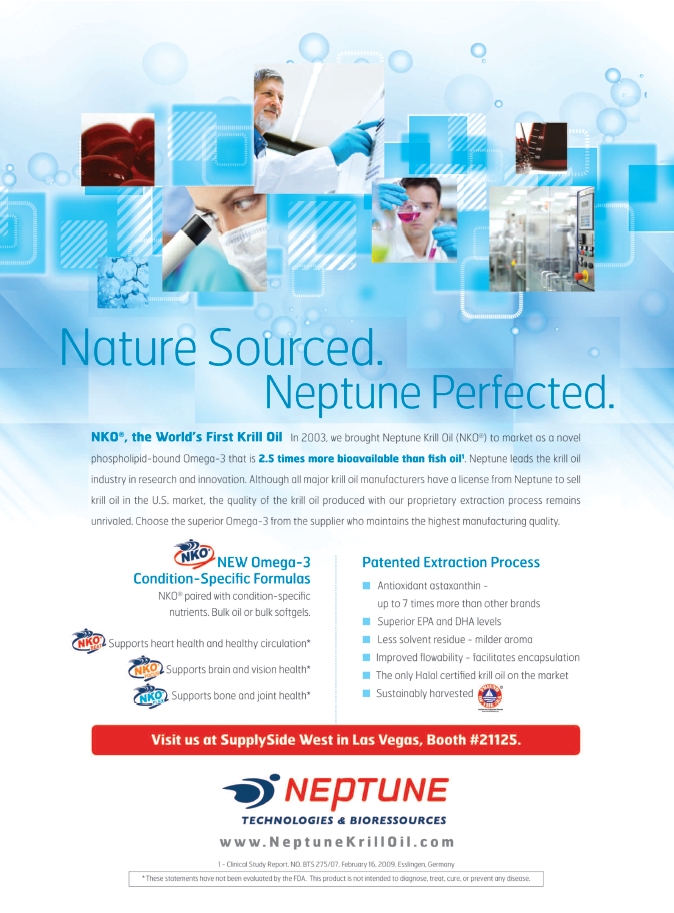 Israel agrees that the drop in sales hasn’t been uniform across all omega-3 products: “higher concentrates and enhanced (non-EE) forms are actually growing. There are market indicators that casual consumers who were not truly invested are leaving, but the majority are committed and trading up in quality.” This latter point lines up well with Clouatre’s belief that natural products stores have a leg up on the mainstream for selling omega-3s.
Israel agrees that the drop in sales hasn’t been uniform across all omega-3 products: “higher concentrates and enhanced (non-EE) forms are actually growing. There are market indicators that casual consumers who were not truly invested are leaving, but the majority are committed and trading up in quality.” This latter point lines up well with Clouatre’s belief that natural products stores have a leg up on the mainstream for selling omega-3s.
Like Israel, Koon say his firm is seeing more demand for higher concentrate marine oils. And Murray of Xsto Solutions anticipates stronger sales for the category in the second half of 2014, with a greater draw to higher concentrate oils and smaller soft gels. “The capacity within the industry to concentrate has also increased so there is still a balance of competitive pressure,” he predicts.
Recent sales figures from Barlean’s, which sells plant-based omegas in addition to marine, suggests that “consumers may be trying other sources like flaxseed oil or chia seed,” according to Koch. And, Clouatre states that sales of his firm’s phospholipid omega-3 oils (non-krill) have remained solid.
Interestingly, several interviewees say non-anchovy fish oils are selling well. For instance, Bluebonnet Nutrition’s top-selling fish oil is Bluebonnet’s Omega-3 Salmon Oil Softgels.
Scott Smith, director of marketing and operations at A.C. Grace, Big Sandy, TX, says a fish oil combination product from his company did not see the drop off some other standard fish oil products did because of its multiple synergistic ingredients.
Other possible factors in the sales decline might be competition from pharmaceutical fish oils, and this won’t stop anytime soon. GOED estimated in April of this year that 46 drug companies were developing or marketing omega-3 DHA and/or EPA products. Sixteen drug companies were looking into new ways to use DHA and/or EPA in pharmaceutical applications.
Other shoppers lack trust in supplements and that certain claims like “no fishy burp” are true, says GOED (1).
The Story Continues
Interviewees previously noted that marine oils have incredible research backing for a wide variety of health benefits, including brain, eye, joint and cardiovascular support. But despite the large mass of research, scientists are far from content with the evidence; they crave more information about the benefits of marine oils and even more data is published every month in scientific journals.
Experts interviewed for this piece have had their  eyes on this new work, and several studies have piqued their interest. Many are prime for discussion with your clientele, provided no disease claims are made.
eyes on this new work, and several studies have piqued their interest. Many are prime for discussion with your clientele, provided no disease claims are made.
Brain health. Researchers have long known of the critical role that supplemental DHA plays in proper brain development and cognitive support. But, there is even more to learn. “Emerging research on the importance of omega-3 fatty acids for brain development is fascinating and of great interest to me,” states Susan Hazels Mitmesser, Ph.D., director of nutrition research at Solgar, Leonia, NJ. She says omega-3 fatty acids make cellular membranes more fluid, “which enhances the transfer of information to and from the brain.” In the end, this may support normal learning, behavior and cognitive function.
Clouatre says there have been several especially intriguing research findings in the past couple of years supporting DHA for brain health. “For instance, researchers have found that DHA seems to exert a protective effect upon the brain in the face of certain challenges, such as alcohol (4),” he states. “Or, even more recently, findings show omega-3 supplements taken regularly reduce the rates of cognitive decline and brain atrophy in older adults.”
Also on the subject of brain health, Efrat Manoff, omega-3 category manager, and Sigalit Zchut, Ph.D., director of R&D at Enzymotec, Migdal HaEmeq, Israel, were impressed by a paper published in Nature this past spring (5). We have known that DHA cannot be synthesized in the brain, and must therefore be transported across the blood–brain barrier. But all the ways in which the brain takes in DHA have been a mystery. New research now suggests just how “a special transporter located in the blood–brain barrier selectively transports a phospholipid bound to DHA into the brain,” says the pair from Enzymotec. Krill oil is an example of a phospholipid-bound omega; traditional fish oils are bound to triglycerides.
“It seems evident that phospholipids bound to DHA have a special role in the building and correct structuring of the brain, and most likely, of other important organs as well,” they state.
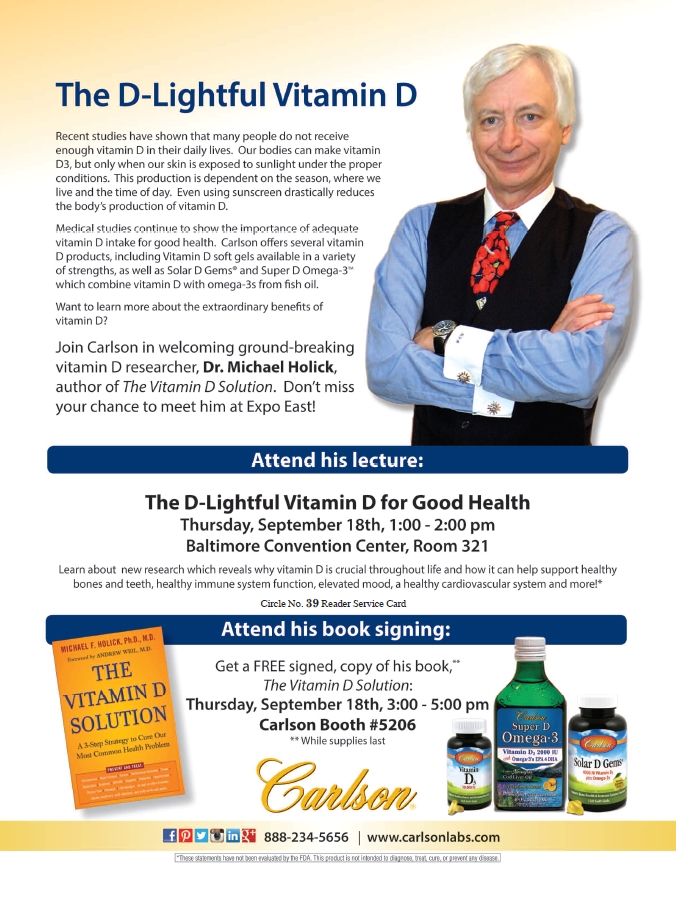 The same study made an impression on Massrieh, as he believes it demonstrates an “advantage of krill oil over traditional omega-3 in supporting cognitive health.”
The same study made an impression on Massrieh, as he believes it demonstrates an “advantage of krill oil over traditional omega-3 in supporting cognitive health.”
Allergy care. A novel study (6) of interest to Murray of Natural Factors indicates that women who take fish oil during their pregnancy may reduce the prevalence and severity of food allergies, eczema and asthma in their children. The study involved 533 healthy pregnant women who took fish oil (2.7 g EPA+DHA per day), olive oil or no oil starting at 30 weeks of pregnancy. The researchers checked in with the mothers when the children were 16 years old, and found the rate of developing asthma due to allergies was reduced by 87% in the fish oil compared with the olive oil group.
“With seven million American children under the age of 10 suffering from asthma, think about the public health impact on asthma rates alone by giving mothers fish oil supplements,” says Murray. “But, this is not all that these oils do. They are also linked with reducing the risk of post-partum depression, as well as boosting baby brain development and IQ.”
Immune system activity. Holtby says that large amounts of EPA and DHA may support healthy immune responses, including inflammatory responses.
While supplements cannot be said to cure, prevent or treat any disease, there is some interesting research highlighted by Herb Joiner-Bey, N.D., Barlean’s scientific advisor, suggesting “omega-3s inhibit cancer development.” He explains that omega-3s alter signal transduction within cells, which may stop the growth of malignant cells. “Omega-3s induce the generation of destructive reactive oxygen species (free radical generators) inside cancer cell mitochondria (energy-producing organelles) in order to destroy the cancer cell’s energy sources,” he explains. They also induce enzymes involved in cancer cell apoptosis. “Remarkably, all of this is accomplished without harming healthy, normal cells,” states Joiner-Bey.
Keeping fat in check. Koon is intrigued by the research showing 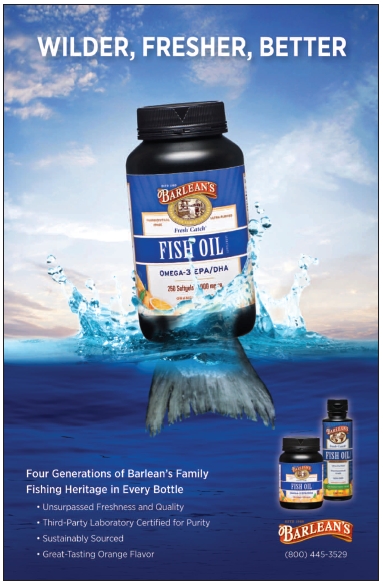 large amounts of EPA (like prescription fish oils) help lower triglycerides. He states, “Imagine, one oil used to lower the blood level of other oils!”
large amounts of EPA (like prescription fish oils) help lower triglycerides. He states, “Imagine, one oil used to lower the blood level of other oils!”
This is not the only way healthy fats support healthy fat levels. Levin says,“Non-alcoholic fatty liver disease, which is a growing concern but which has no licensed medical treatment, responds to DHA from EPA-DHA supplementation that results in a lineal lowering of liver fat percentage.”
The WELCOME Study gave 51 individuals with the disease EPA/DHA (4 g/day) for 15–18 months while 52 others took a placebo (7). Evidence suggested DHA was “independently associated with a decrease in liver fat” (7).
All these fine studies point to the fact that “fat” isn’t something to fear when it is the healthy kind. Sugarek MacDonald explains that the outdated assumption that eating less fat makes us thinner was harmful because it gave shoppers the false sense of security that they could eat fat-free processed snacks with no negative consequence. “The truth is that this new way of life, being ‘Fat-Free,’ increased the already bulging waistlines simply because Americans began to carbo load,” she states.
Heart health. Cardiovascular care may be one of the most researched areas for omega-3s. Andreas Papas, MSc, Ph.D., science advisor for A.C. Grace Company, says omega-3s were found in studies to help improve blood lipid profiles by lowering blood triglycerides; inhibit inflammatory mediators; offer mild antihypertensive effects; reduce heart arrhythmias; and reduce hypercoagulability.
The data backing of omega-3s for heart health continues to grow. “Earlier this year, we published the largest human study conducted on krill to date that showed a 10% reduction in triglycerides and 70% increase in the omega-3 index,” states Wright.
|
Reader Request: Krill Update Last month, a member of the WholeFoods LinkedIn community asked for an update about the impact of harvesting krill and plankton for oils on the ecosystem. Krill fishing has faced a perception problem about its effect on marine life. Could overfishing be problematic for whales, seals and other large sea animals that rely on krill for food? “The facts on the ground (or in the water) have not changed; this is a non-issue,” states Kenn Israel, vice president of marketing for Robinson Pharma Inc. “Human harvesting of krill at its current levels does not impact the stability of this biomass. The major krill players are garnering certifications for responsible behavior and sustainable practices.” For instance, the Commission for the Conservation of Antarctic Marine Living Resources (CCAMLR) is a treaty between 25 Becky Wright, marketing director, Aker BioMarine Antarctic US, says in the Antarctic region (Area 48) where krill fisheries are authorized to operate, only 1/3 of 1% of the krill are harvested. “The reality is the Antarctic krill fishery is one of the most regulated fisheries in the world, which is why it is one of the most environmentally friendly sources of omega-3s on the market today,” she states. Also citing CCAMLR numbers, Wael Massrieh, Ph.D., vice president of scientific affairs at Neptune Technologies & Bioressources, Inc., states, “In 2012–13, the industry only harvested 0.16% of the total krill biomass.” And, Neil E. Levin, CCN, DANLA, NOW Foods nutrition education manager, makes the excellent point that most of the harvested krill doesn’t end up in supplements bottles. “About 99% of that harvest is going into fish and pet food, not into dietary supplements,” he states. As for algal sources of omega-3s, he says most are grown in controlled environments, “precluding any environmental impact from their harvest.” There are other ways to maintain ecofriendly fishing of krill. Efrat Manoff, omega-3 category manager, and Sigalit Zchut, Ph.D., director of R&D at Enzymotec, add companies, like theirs, that are serious about protecting the ocean’s ecosystem also use sustainable fisheries (like those that are certified by Friend of the Sea). But Steve Holtby, president and CEO of Soft Gel Technologies, Inc., says there could be some room for improvement, as the Pew Environment Group’s Antarctic Krill Conservation Project (AKCP) urges CCAMLR to conduct a new krill biomass survey and wants new procedures for protecting krill and other ocean wildlife that rely on the species for food. The group even started a photo petition Web site to raise awareness of their cause. Some also worry about the techniques used by certain fisheries. But, Alene Johnson, educator and trainer for Barlean’s, believes that her company’s krill oil supplier (Aker BioMarine) uses a safe harvesting method to “ensure no by-catch of other species and is not impactful to the sea floor in any way.” Still, some industry members believe it’s not worth any potential risk to the ocean’s ecosystem that krill harvesting may cause. “When you’re harvesting the food that whales rely on, you’re heading down a slippery slope,” states Cheryl Myers, chief of education and scientific affairs at EuroPharma, Inc. She suggests Atlantic salmon caught in the clean water fjords of Norway and Scotland. Her company uses material from the heads for its unique health properties, while the body is used for food, so there is no waste. |
In the study (8), researchers divided 300 individuals into five groups, giving them 0.5, 1, 2 or 4 grams of krill oil (as Superba from Aker BioMarine) per day or placebo (olive oil). “Those administered Superba krill oil had a statistically significant 10% reduction in serum triglyceride levels,” says Wright, adding that LDL-C levels were not increased in the krill oil groups relative to the placebo group. The krill oil also raised subjects’ omega-3 index, and this result was most pronounced in those taking the largest quantities of krill oil.
Where Do We Go from Here?
The research supporting the incredible benefits of marine oils is strong, but there is always room to grow. Clouatre would like to see some additional research about the cardiovascular benefits of omega-3 oils, since some research has called into question this benefit.
Murray of Xsto Solutions wants the literature to grow on the benefits of phospholipids, which he believes is “a very exciting area where we are just scratching the surface.” At the same time, Manoff and Zchut want to know whether there are transporters on organs other than the brain that use phospholipid-bound DHA and EPA.
Also regarding additional research on omega-3s for brain health, Hazels Mitmesser believes that scientists should consider studying the link between omega-3s and probiotics. She states, “There is preliminary research in cell and animal models showing a link between the gut microbiota and the brain.”
And Israel believes the implications of omega-3s for both ends of the life spectrum should be investigated in terms of brain health. “What are the implications on early childhood learning, behavior, and social and economic success as adults? On the other end of the spectrum, how can a lifetime consumption of healthy fats impact vitality at old age, independent living skills, and costs of end of life care?” asks Israel.
Future research may not only deal with omega-3s’ direct effects on the individual, young or old; it may investigate the impact of omegas on later generations. Joiner-Bey calls this field of study epigenetics, in which DNA gene expression is controlled by various influences such as the proteins around DHA strands. “Scientists are discovering the influence diet and environmental factors in the lives of parents have on the health of their children and grandchildren. By way of influencing epigenome behavior, omega-3 status in parents has an important role in determining what genes are expressed in their offspring. We need more research on how omega-3s and other nutrients influence the well-being of generations of humans yet unborn."
As research continues to branch out, several interviewees make the case for studies that have a responsible design. For instance, some researchers have not been careful about which studies get included in meta-analyses. Often, says, Joiner-Bey, “poorly controlled and mismatched studies are inappropriately combined in reviewing past research, leading to erroneous conclusions.” He also feels that one should not overinflate the implications of population studies, which is also an area that could be improved.
Likewise, Larsen says many studies have not tested the omega-3 status of subjects who participate in omega-3 research, a major oversight since having high or low tissue concentrations of omega-3s will affect the dosage needed to achieve statistically significant results, he explains.
Says Larsen, “For example, if researchers choose subjects who have very low omega-3 levels (remember, 90% of Americans are omega-3 deficient) and then give them one gram of omega-3s for a relatively short duration, the results will be harder to document than if subjects had sufficient levels to begin with, or if they supplemented with higher, physiologically-appropriate doses.”
With these advances, the marine oils field will expand and be even more secure in fighting negative studies. WF
|
Select Marine Oils Offerings A.C. Grace: UNIQUE OMEGA E+ and UNIQUE OMEGA Krill Oil. |
References
1. E. Schutt, “Trends in the Omega-3 Market,” presentation given at Ingredient Marketplace, New York, NY, June 2, 2014.
2. T.M. Brasky, et al., “Plasma Phospholipid Fatty Acids and Prostate Cancer Risk in the SELECT Trial,” J. Natl. Cancer Inst. (2013); doi: 10.1093/jnci/djt174; First published online: July 10, 2013.
3. B. Sarter, et al., “Blood Docosahexaenoic Acid and Eicosapentaenoic Acid in Vegans: Associations with Age and Gender and Effects of an Algal-Derived Omega-3 Fatty Acid Supplement,” Clin. Nutr. 2014 Mar 14. pii: S0261-5614(14)00076-4. [Epub ahead of print]
4. N. Tajuddin, et al., “Neuroinflammation and Neurodegeneration in Adult Rat Brain from Binge Ethanol Exposure: Abrogation by Docosahexaenoic Acid,” PLoS ONE 9 (7), e101223 (2014).
5. L.N. Nguyen et al., “Mfsd2a is a Transporter for yhe Essential Omega-3 Fatty Acid Docosahexaenoic Acid,” Nature, 509 (7501), 503-506 (2014).
6. S.F. Olsen, et al., “Fish Oil Intake Compared with Olive Oil Intake in Late Pregnancy And Asthma in the Offspring: 16 Y of Registry-Based Follow-Up from a Randomized Controlled Trial,” Am. J. Clin. Nutr. 88 (1), 167–175 (2008).
7. E. Scorletti, “Effects of Purified Eicosapentaenoic and Docosahexaenoic Acids in Non-Alcoholic Fatty Liver Disease: Results from the WELCOME Study,” Hepatology. 2014 Jul 4. doi: 10.1002/hep.27289. [Epub ahead of print].
8. K. Berge, et al., “Krill Oil Supplementation Lowers Serum Triglycerides Without Increasing Low-Density Lipoprotein Cholesterol In Adults With Borderline High or High Triglyceride Levels,” Nutr. Res. 34 (2), 126–133 (2014).
Published in WholeFoods Magazine, September 2014

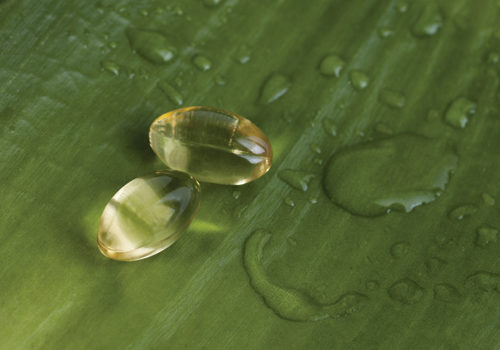
 nations with the goal of managing Antarctic fisheries for the protection of the Antarctic marine ecosystem.
nations with the goal of managing Antarctic fisheries for the protection of the Antarctic marine ecosystem.